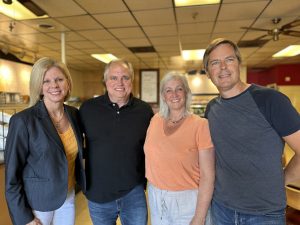It feels like a lifetime ago since we first met V.L. (Lynette) Cox. It has only been a few weeks. VL is one of those special spirits that once you invite them into your world nothing else is ever the same. Thankfully it is reflected so well in her art that it influences people without ever knowing her name.
We caught up with Cox initially during a showing of her latest piece, River Bridge, at South on Main last month. Over the course of the next several weeks, as the debate on HB 1228 (Religious Protection Act) heated up, it was another one of Cox’s works that stood as a center piece for the debate with her “End Hate” piece. The piece featured a series of doors with various different labels that have been used in the past to discriminate, with the phrase “separate is never equal” as the message of the piece.
Cox was not always showing her work on the steps of the state Capitol or in front of dozens of television cameras. Cox comes from a long line of artists from her great-grandmother, who was a painter, to her father who was an illustrator.
Her story begins in Arkadelphia, Arkansas when her grandmother enrolled her in a summer art program at Henderson State University (HSU) at the age of ten. It was there that she met professor Joe Scott who would continue to be a mentor for her. Cox would later enroll and complete a bachelor’s degree in art at HSU after dropping out of college at Arkansas Tech several years earlier.
It was during this time between schools that Cox began to develop her own personal style while working in the scenic industry constructing and painting and constructing large backdrops for theatrical organizations around Dallas.
“It was a great time to be a freelance artist there. There were tons of opportunities,” Cox says. “You worked on a set with a team, when you finished that up you had some money and there was always another job waiting on you.”
Cox would return to Arkansas after her grandmother became ill. She found the creative scene in Arkansas to be much different.
“When I came back it was like walking into a desert of creativity in Arkansas, ” Cox says. “There was nothing here at the time. The Rep (Arkansas Repertory Theater) really came a long way since then. They were not even doing their own sets back in 1997 when I came here looking for work.”
Cox grew her reputation over 26 years of painting and working as an artist earning multiple awards and honors over the time.
“The Art community has come a long way in my time here,” says Cox. “I see more and more artist talking and communicating more. Networking has gotten a lot better thanks in part to social media.”
Not only has the artist themselves grown, but so has the art collecting community.
“I think the value of collecting regional art has improved,” Cox says. “I would put our talent here in Arkansas against anywhere else in the country. I think people are starting to realize the value of the talent we have here and local collections have gone up considerably.”
Cox was able to grow into a lot of galleries along the east coast and across the nation. Following the recession many of those galleries shut down. Cox took that as an opportunity to refocus and show strongly in Arkansas and surrounding regions.
“I pulled back after taking the advice of one of my dearest collectors. She encouraged me to focus regionally since the south is the focal point of the stories I tell,” Cox says.
The story of the south plays heavily into her work. It is seen in pieces like her recent River Bridge work that features an old bridge (now demolished) over the Ouachita River, however it also plays out in some of the darker story of the south. A new theme for Cox has been discrimination, both racial and sexual orientation, which has been some of Cox’s most powerful work including the “End Hate” piece mentioned earlier.
“I’ve never told the story of the south as it relates to discrimination before which is one of those things that has not been talked about much before but I think it needs to be talked about,” Cox says. “I hear too many people still use very slanderous terms and as I’ve gotten older I realized that I can’t stand for that anymore. I think if we can get people talking, which is what I hope my work will do, then we can find peace and acceptance”
Cox has displayed her “End Hate” exhibit throughout Arkansas including multiple visits to the state Capitol and Governor’s mansion. Cox announced recently plans to take the exhibit to Washington DC on April 17th.
“My grandmother was like this, she was a big inspiration to me,” Cox reflects. “She always thought of others before her self. I hope one day before I die that I become half the woman she was.”
“Mrs. Annie Abrams mother (known as Queen Victoria) and here were best friends, they spent every Saturday together,” “Mrs Annie told me once that she knew her grandmother was a domestic… I told her Mrs Annie, your mother was her friend. They ironed together, they drank coffee together. I remember them sitting at the table together after the national guard was called into Clark County shortly after the Central High crisis and they were wondering about the future of the next generation. It was a white woman and a black woman together as friends in the height of the civil rights movement in Arkansas, and that is how I grew up and how I see the world.”
Cox feels that while many strides have been made in equality, there is a lot of ground to make still.
“It seems like people are just afraid now,” Cox continues. “People have become afraid of things that are different. I am not afraid to get old, I am not afraid of different people. I am afraid of two things; close mindedness and I am absolutely terrified of tornadoes. People should not be afraid of others who are different. They should be afraid of tornadoes.”





